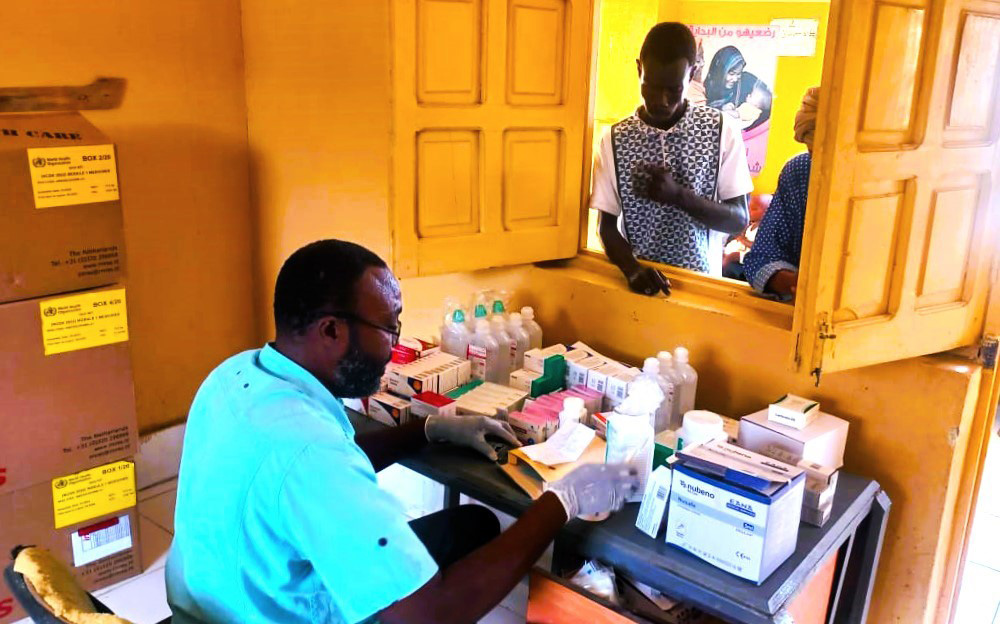 Photo caption: Patients line up for pharmaceutical services at a WHO-supported PHC in River Nile State Photo credit: WHO/WHO Sudan
Photo caption: Patients line up for pharmaceutical services at a WHO-supported PHC in River Nile State Photo credit: WHO/WHO Sudan
6 November 2024, Port Sudan, Sudan – The war that broke out in April 2023 and earlier political and social unrest have displaced 14 million Sudanese, 11 million of whom are sheltering across Sudan’s 18 states. Within the last 18 months many have been displaced multiple times, moving to locations where basic necessities, including food, water, health care and medical supplies, are scarce.
Having fled their homes, they find themselves without enough to eat, still facing the threat of violence, in situations where illnesses are left untreated due to lack of access to health care, a result of the closure of health facilities or their unreachability due to distance and insecurity.
Shortages of medicines, medical supplies and equipment and the lack of funds to cover operational costs, fuel for generators and the salaries of health care workers have forced hospitals and health facilities to close their doors in most states.
Sudan’s health system, already struggling before the war, is on the brink of collapse. Around 80% of health facilities in conflict hotspots are non-functional. A Health Resources and Services Availability Monitoring System (HeRAMS) report conducted in 5 states found only 45% of health facilities fully functional, leaving more than 65% of the population, many of them internally displaced, with little if any access to basic health care and medicines.
Displaced persons and host communities can now access primary health care at centres supported by WHO
To support the provision of basic health care, with a focus on serving displaced populations, WHO, in partnership with the Federal and state ministries of health and the National Health Insurance Fund (NHIF), has launched a project to provide direct support to 60 primary health care centres across 10 states.
Since the launch of the project in June 2024, WHO is supporting 59 facilities in 9 states – Northern, River Nile, Red Sea, Kassala, Gedaref, Sennar, Blue Nile, Al Gazira and White Nile – providing critically needed services to displaced people and host communities.
“In the face of growing health needs, WHO is focused on ensuring essential and lifesaving health care services are available to vulnerable populations. Through support to primary health care centres we aim to ensure health care is available to internally displaced persons and host communities,” says WHO Sudan Technical Officer for Health Systems Strengthening Dr Imadeldin Ismail.
WHO works with state ministries of health and NHIF to reactivate and enhance the operational capacity of primary health care centres by building capacity and human resources and securing medical supplies. Between June and October 2024, WHO delivered 40 metric tons of medical supplies, including antibiotics, malaria medicines, medicines for the management of chronic diseases such as hypertension and diabetes and diagnostic and emergency services supplies to 59 primary health care centres to meet the health needs of displaced and other vulnerable people.
“We will expand and scale up primary health care facilities to ensure sustainable services to all communities across the country,” said the Deputy Director of the Primary Health Care Expansion Directorate at the Federal Ministry of Health Dr Asim Mahmoud as he expressed appreciation for WHO’s support in helping ensure the availability of primary health care services in Sudan.
Within 4 months of launching of the project, more than 287 762 patients received primary health care and referrals for common illnesses, noncommunicable diseases, infectious diseases like malaria and dengue, prenatal care and delivery at WHO-supported health facilities, of which 108 710 patients (38%) were internally displaced persons. More than 50 000 children aged under 5 years accessed services and more than 17 301 consultations were provided to pregnant women.
“I am thankful for the free health care services, like medical consultations, laboratory testing and medicine, that meet most of our needs. I hope these services will continue uninterrupted,” said Yassin Mohammed, displaced from Khartoum and staying close to a WHO-supported primary health facility in White Nile State.
WHO is providing this crucial support to Sudan’s health system with the generous support of the European Union, the Government of Canada and the United Nations Central Emergency Response Fund.


